Unlocking Synergies for Women's Land Rights: Bridging Rio Conventions with Grassroots Organizations
This year’s Women’s Land Rights Initiative, co-hosted by TMG Research, the Robert Bosch Stiftung, UNCCD, UNCBD and UNFCCC, brought together 50 stakeholders to interrogate the role of women's land rights within the Rio Conventions.
by Frederike Klümper (TMG Research), Laura Rahmeier (Robert Bosch Stiftung), Karen Elizabeth Bernard and Marcos Montoiro (UNCCD), Wiebke Bender (UNFCCC), Olivier Rukundo (UNCBD) | 2024-07-01

Everything we do relies on land. You don’t have to call something ‘land’ to work on it. When we talk about land in the context of the UNCBD, we will find that most of the 23 targets are linked to land and land rights. However, we need to navigate the complexity and ambiguity to bring land issues into the discussions – in all three Conventions, because if we don’t, there will be consequences for local communities already using the land, and then we will have failed.
- Olivier Rukundo, UNCBD
This year’s Women’s Land Rights Initiative (WLRI), co-hosted by TMG Research, Robert Bosch Stiftung, UNCCD, UNCBD and UNFCCC, brought together 50 stakeholders to interrogate the role of women's land rights (WLR) within the Rio Conventions. The event was organized as part of the celebrations of the Desertification and Drought Day. The starting point was clear: land is the unifying thread across the Rio Conventions, with each dependent on land-based measures to achieve their targets. This spells direct consequences for grassroots women’s right to that land, and in tandem, their lives and livelihoods. Moreover, women’s actions are what ultimately contribute to realizing the objectives of the Conventions on the ground: restoring land, mitigating and adapting to climate change, combating desertification, and preserving biodiversity. As a result, utilizing the Rio Conventions as a mechanism for protecting and recognising women’s land rights must be a priority. And breaking down silos to achieve this took centre stage at the WLRI this year. Advancing women’s land rights across all three Conventions is an imperative – and opportunities exist.
The main question was therefore clear: How can we advance the recognition of women’s land rights by leveraging synergies across the Rio Conventions — UNCCD, UNCBD and UNFCCC —and by strengthening grassroots perspectives in Convention spaces?
Why synergies matter? Bridging divides for collective impact
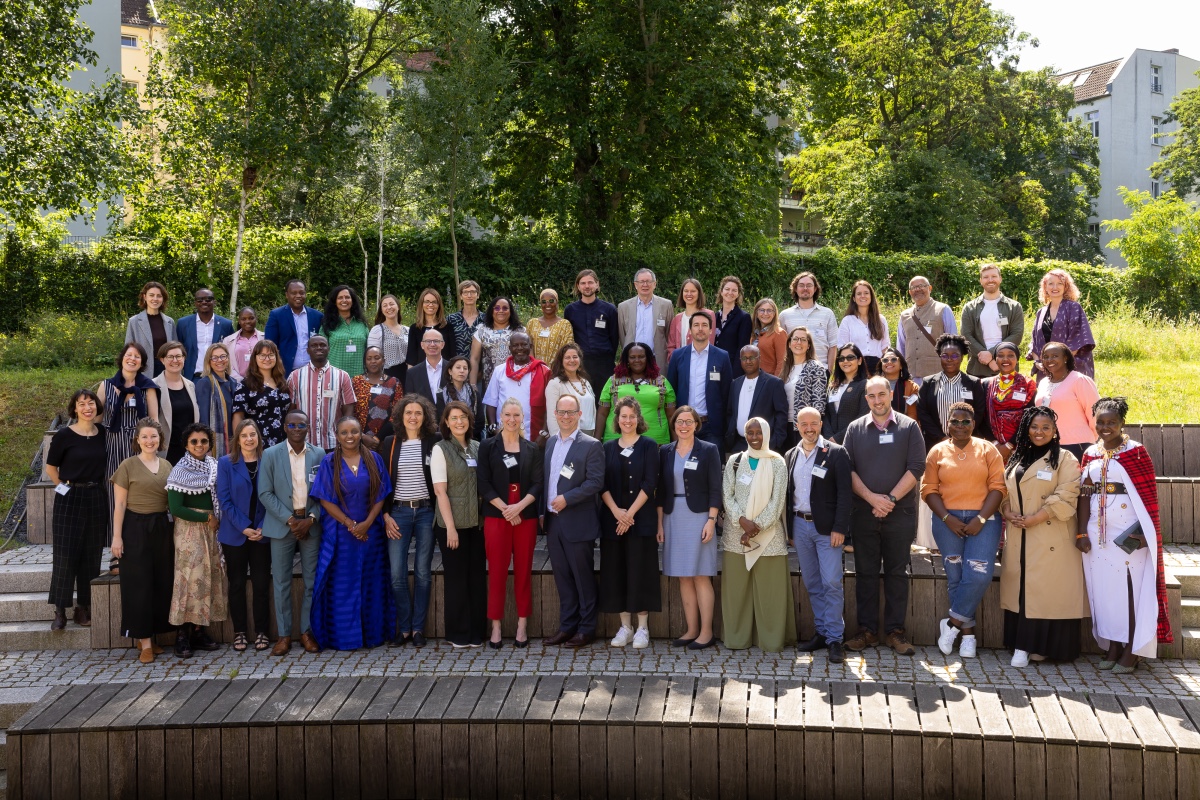
Participants pose for a photo after the workshop. © Manuel Frauendorf
Synergy effects are more than the sum of their parts. The three Conventions refer to women’s land rights individually to varying degrees, either directly or indirectly. This opens a window of opportunity to use these unique entry points to advance women’s land rights by: asking countries to integrate legitimate tenure rights in land degradation measures, building on human rights obligations, ensuring equal participation in decision-making and access to justice in protected areas, referencing women’s rights in (national) gender action plans.
With the same land concerned, harnessing these entry points to build a unifying foundation across the Rio Conventions’ framework can help us ensure actions reinforce each other, rather than compete with or come at the expense of land rights. Ahead of our workshop, we focused on identifying specific entry points and opportunities within the Conventions to advance women's land rights. These opportunities can either already exist and we can identify and capitalize on them, or we can actively work to create them. By exploring how we can link the entry points, the windows of opportunity, for (women’s) land rights within the Rio Conventions, we can amplify the impact for women’s land rights and make our efforts more effective and sustainable. Here are three examples of how we can do that:
Collaboration and cooperation: By sharing ideas, resources and strategies between actors active in different Convention contexts, we can foster innovation and increases the effectiveness of WLR initiatives and advocacy.
Learning from each other: One convention's work on WLR can offer valuable insights and strategies that others can adopt, enhancing WLR initiatives overall.
Cost and resource effectiveness: Sharing resources saves time and money, allowing us to focus on making a more significant impact without unnecessary duplication of efforts.
A key example of lived synergies came from Valérie Ramahavalisoa, UNCCF focal point at the Ministry of Environment and Sustainable Development of Madagascar, who detailed how her country reformed their approach to the Rio Conventions by enhancing cooperation across ministries and civil society organizations. The country’s positions towards the three COPs are now built on inclusive national consultations involving youth, gender groups and grassroots organizations and integrate joint policy and legislative issues. Ideally, these kinds of coordinated approaches lead to countries integrating cross-cutting issues into their national plans under the different Conventions. In fact, Madagascar’s National Adaptation Plan under UNFCCC is one of the few that references women’s land rights, placing it within a strategic priority on securing land tenure to enhance adaptation measures.
Last year, in July 2023, TMG Research, Robert Bosch Stiftung and the UNCCD organized the first workshop with actors from all three conventions to discuss women's land rights in this context. Building upon last year's groundwork, this year's workshop clearly focused on synergies across the Rio Conventions and a strategic focus on strengthening grassroots participation (full concept note here).
How to root global debates in grassroots perspectives? Grassroots and Civil Society strategies
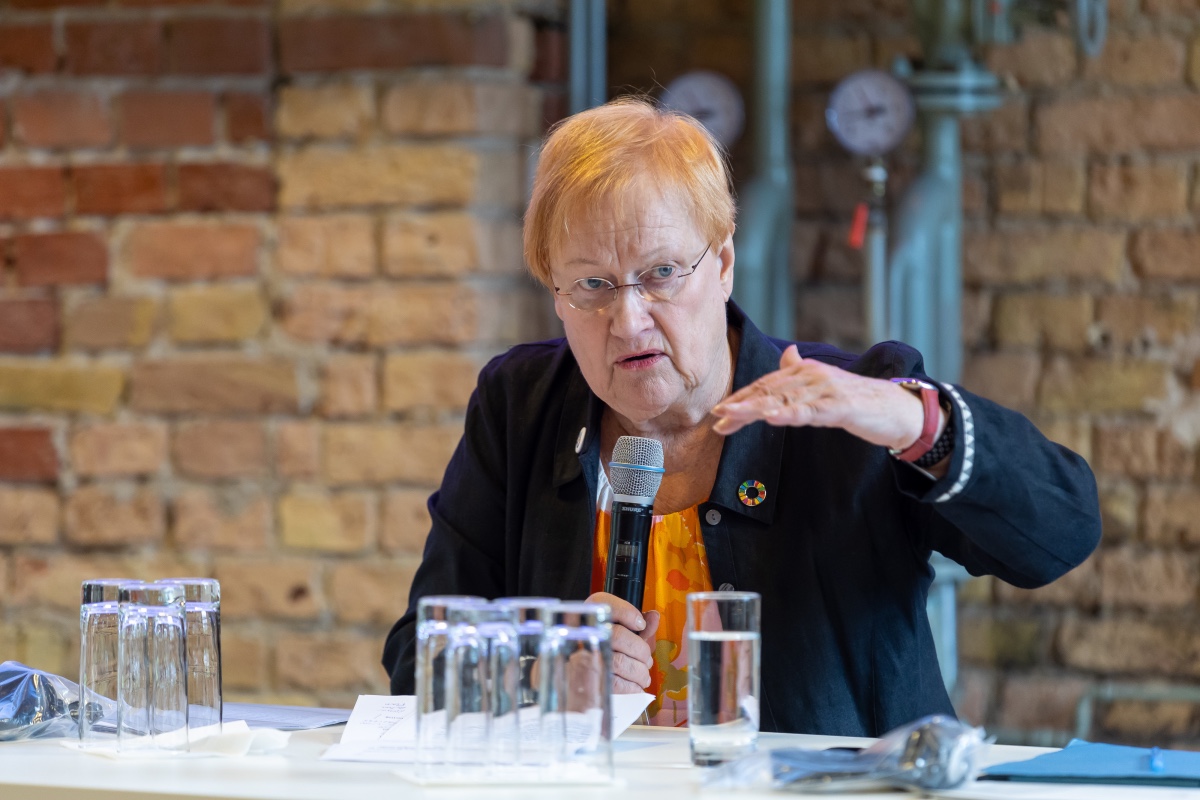
Tarja Halonen, former President of Finland, UNCCD Land Ambassador © Manuel Frauendorf
When women’s full and equal rights and participation in decision-making are ensured, they become crucial powerful actors in protecting and restoring the land. Partnership and collaboration are needed more than ever to advance women’s empowerment and secure land rights for women.
- H.E. Tarja Halonen, former President of Finland
Social participation in political decision-making is a crucial factor in promoting democratic governance. Rooting global discourses on women’s land rights in grassroots perspectives is no longer debatable. The question now is - how. Grassroots organizations have immensely critical perspectives that should be given a platform to influence global-decision-making processes. And, as the participants emphasized, we must not forget to create spaces to articulate positions, and to translate global discourses and negotiations to the local level so that local communities can benefit from and contribute back to international policies.
Answering the question of ‘how’ is undoubtedly about addressing difficult questions such as how to create spaces for grassroots involvement (and for whom) so as not to intimidate and to recognize alternative modes of intervening, what support structures are needed, and how processes of involvement need to be changed, for instance to afford actors ample time for preparation. The different Conventions already provide space for civil society to exert their voices to varying degrees, from independent CSO mechanisms such as some caucuses, CSO platforms coordinated through the Secretariats, to observers or contributors to the negotiations.
You need to make the measures realistic. It is not enough to discuss local implementation. You need to understand the role of the community. Who is experiencing the real scenario? Our role (of grassroots) is not institutionalized, neither as rapporteurs nor as conveners, our participation is not institutionalized. It's not just about bringing people to international events. We need a more formal way to be in an equal position to inform and make decisions.
– Violet Shivutse, Shibuye Community Health Workers
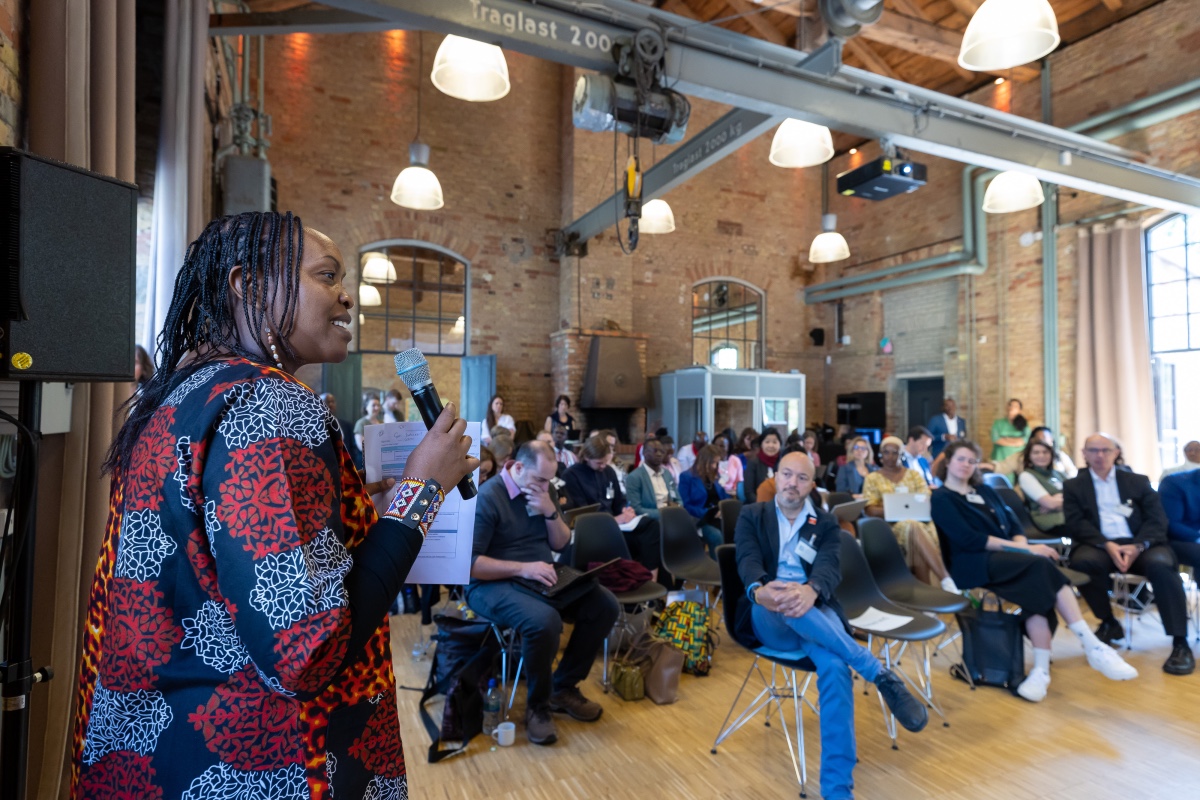
Q&A Session: Participants posted their questions throughout the workshop. © Manuel Frauendorf
What kind of space? Room to dream and to be realistic
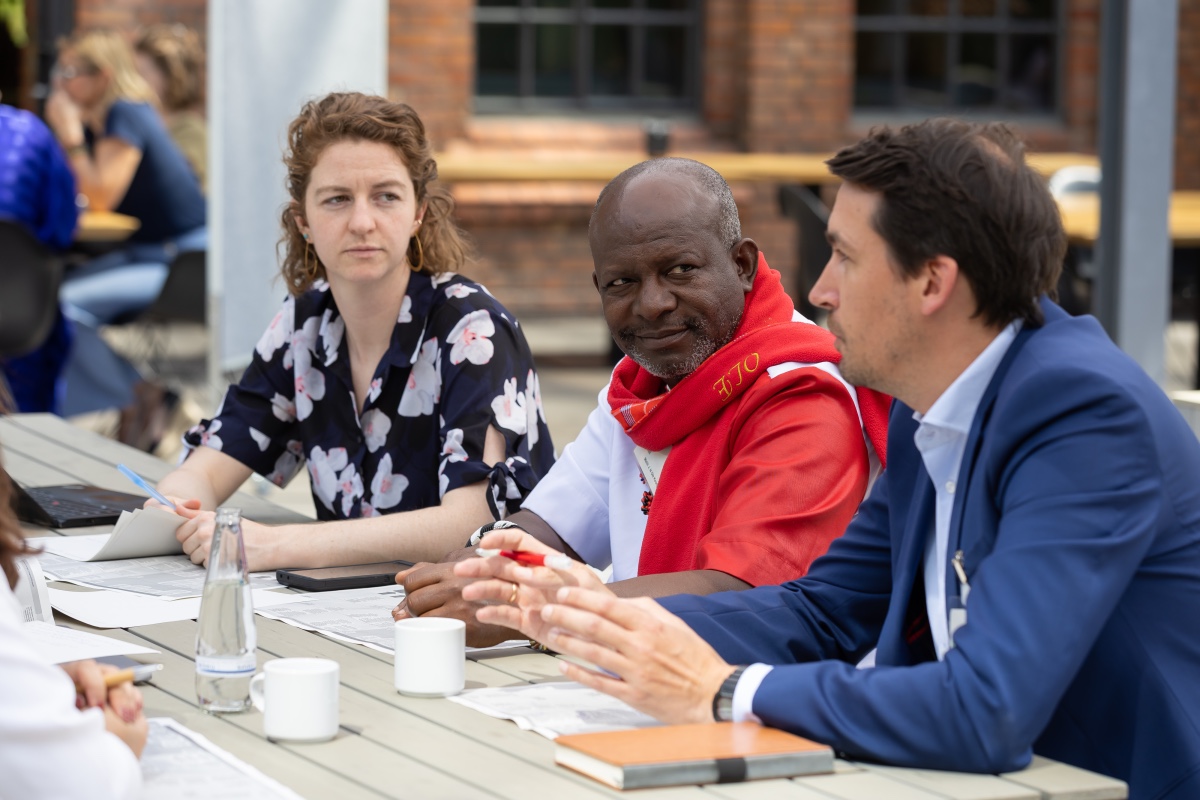
Participants discussing in groups at the workshop. © Manuel Frauendorf
The convening has clearly demonstrated how important it is to create space to find structured ways to take realistic steps, to dream big and to think and share freely – but it also showed that it is not easy to find the right balance.
In this spirit, the participants brainstormed possible windows of opportunity for mobilising financing for grassroots organizations within the framework of the conventions' existing funding mechanisms. They envisioned strategies to strengthen the vertical and horizontal coordination of national focal points and focused an important part of the discussion on how to better integrate the perspectives of grassroots organizations into national policy dialogues in order to influence international negotiations. They dreamt big about how to align targets for women’s land rights in national plans to harmonize implementation strategies and enhance monitoring and reporting mechanisms to effectively track progress. They also developed concrete ideas for coordination between women’s caucuses to put women’s land rights issues at the centre of their current agendas, amplify grassroots voices and propel their power in advocacy, learning and inclusion to a next level.
How to move forward? Building continuity and accountability
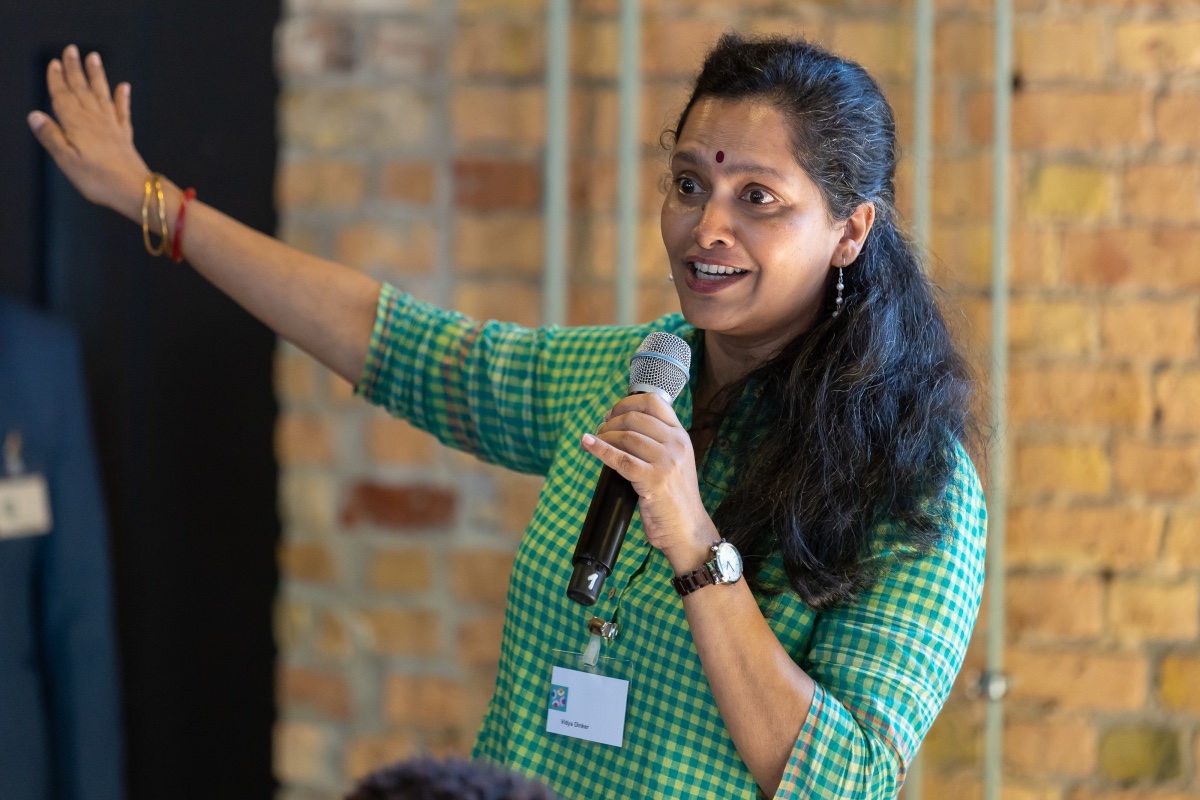
Vidya Dinker - INSAF/ Growthwatch © Manuel Frauendorf
These ideas are critical, and at the same time they can only be the beginning, given the long-term action the change we envision requires. Participants pressed for the space to establish continuity in engagements and in thinking through and following up actions. In this context, the participants expressed that impact can only be achieved if people are accountable and follow up on commitments. To facilitate this, crucial next steps could be to enhance communication across organizations via a joint communication channel, to make transparent and understand each other’s strengths, to develop a roadmap of short- and long-term opportunities, and to concretely coordinate activities, such as side events, towards the three COPs at the end of the year, but of course also beyond.
Our task as hosts is now to put these recommendations and expectations into a forward-looking perspective and to keep holding the space. As Wiebke Bender, from UNFCCC puts it:
It is important to have a joint vision on women’s land rights that can be implemented within and alongside the process
Our approach should remain flexible and conducive to effective advocacy. We can start by focusing on achievable goals or "low-hanging fruit" to kick-start our efforts by coordinating our engagement during the upcoming COPs in Cali, Baku and Riyadh. As Marcos Montoiro from UNCCD highlighted, the forthcoming COP16 to the UN Convention to Combat Desertification to be held as the last COP in the row of three from 2 to 13 December in Riyadh, would offer an excellent opportunity to address WLR during the agenda item “Follow-up on policy frameworks and thematic issues: Land tenure” as well as during People’s Day action agenda. Expanding our network and identifying and bringing fellow drivers of change will be critical to maintaining momentum and driving impact. And perhaps most importantly, providing this space to root actions in grassroots perspectives will be a key determinant of success. As current co-hosts, TMG Research, Robert Bosch Stiftung and the three Rio Convention Secretariats have clearly committed to strategically take forward this initiative and to co-design it with the actors involved.
In conclusion, the WLRI emphasizes the need to institutionalize voices on women’s land rights within and beyond convention spaces. As Beth Roberts puts it:
There is an incredible gift of being together for this workshop on the three Rio conventions because this conversation has so often been siloed. WLR has not been recognized within Rio Conventions spaces nor really within gender equality spaces to the degree that it needs to be.
- Beth Roberts, Landesa
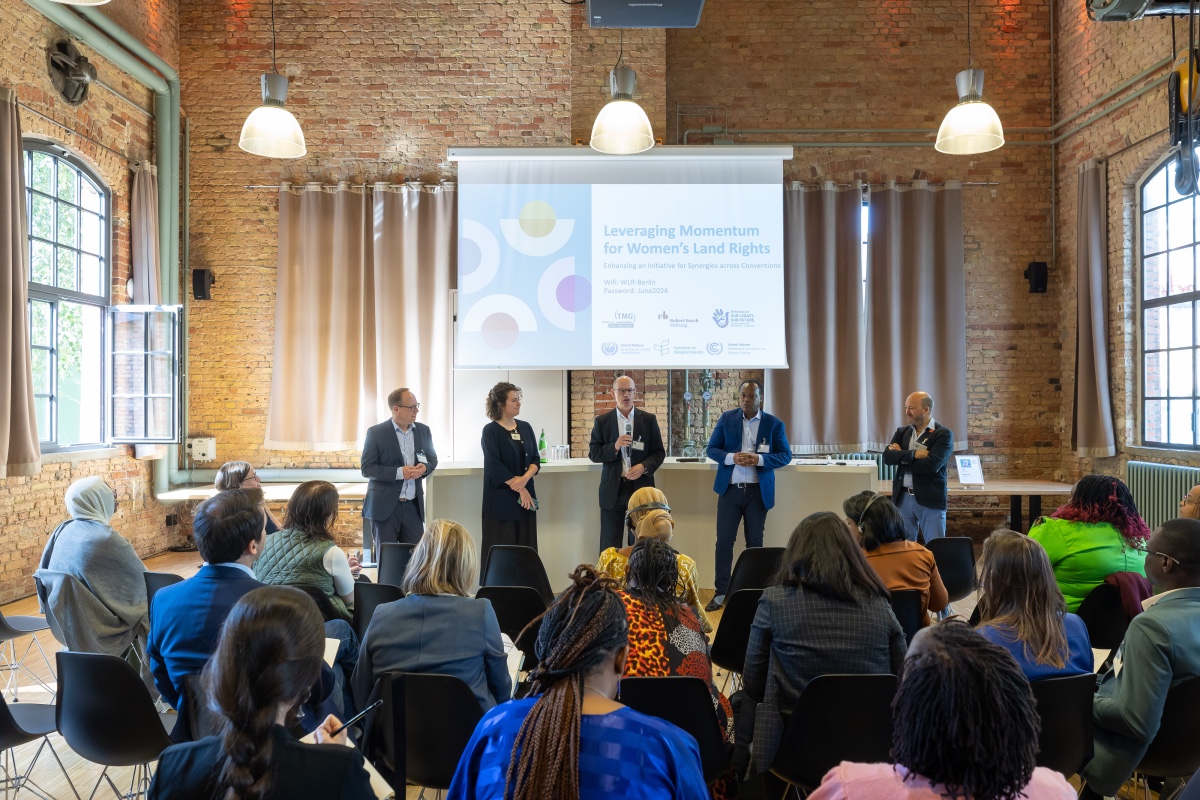
From left, Jes Weigelt, Head of Programmes, TMG Research, Wiebke Bender, Gender Programme Officer, UNFCCC, Bernhard Straub, CEO, Robert Bosch Stiftung, Olivier Rukundo, Head of Unit, UNCBD, and Marcos Montoiro, UNCCD at the workshop. © Manuel Frauendorf
 Urban Food FuturesFeb 09, 2026
Urban Food FuturesFeb 09, 2026Pushing the horizon: Urban farming and community-led innovation in Mukuru informal settlement
A small community-run greenhouse in Mukuru is offering insights into how controlled-environment agriculture can strengthen food security in urban environments under increasing pressure—and a look into the future of food systems in informal settlements.
Christian Sonntag, Emmanuel Atamba, Lumi Youm
 Land GovernanceDec 18, 2025
Land GovernanceDec 18, 2025Land tenure, women’s land rights, and resilience: Reflections from CRIC23 toward UNCCD COP17
Our experts discuss what the exchanges at CRIC23 highlighted and revealed about the role of secure and gender-equitable land tenure in the UNCCD's work ahead of the 2026 triple COP year.
Frederike Klümper, Washe Kazungu
 Urban Food FuturesDec 09, 2025
Urban Food FuturesDec 09, 2025The story of Mukuru's Urban Nutrition Hub
In Mukuru informal settlement, a safe haven for women has grown into the Urban Nutrition Hub, a multi-purpose space for nutrition education, training, and community development, demonstrating the potential of grassroots community-owned innovation..
Serah Kiragu-Wissler


